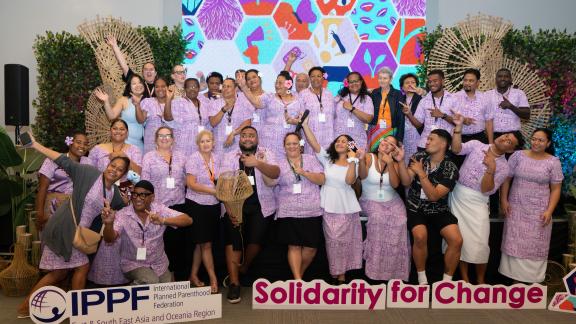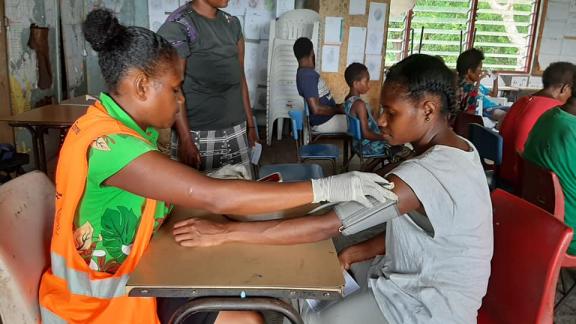Access to Sexual Reproductive Health, Rights and Justice (SRHRJ) remains one of the most widespread issues for women and girls across the Pacific. In the region, the issue is particularly concerning, with some of the lowest rates of ensuring universal access to sexual and reproductive health (SRH) care for young people. Reported rates of sexual and gender-based violence (SGBV), including intimate partner violence (IPV), are high: 68% in Kiribati, and 64% in Fiji and the Solomon Islands (ADB, 2016). Research has found that modern contraceptive usage rates are very low across all Pacific Island Countries (PIC), from 13% in Samoa to 33% in Vanuatu (UNFPA SWOP, 2024). While there has been subsequent progress in legal frameworks and advocacy, lack of access to safe and affordable SRH care continues to persist in various forms, including harmful cultural and religious practices and systemic challenges that further complicate efforts to advance the sexuality agenda.
Advancing Towards Equitable Healthcare
SRHRJ is critical for achieving gender equality and improving health outcomes globally. Addressing the lack of access to sexual and reproductive health in the Pacific comes with major challenges, shaped by the region’s rich and diverse cultural and economic landscape. IPPF Member Associations (MAs), specifically women-led SRHR organizations, are at the forefront of tackling these issues. Women in SRHRJ roles – including midwives, nurses, social workers, advocates, and Executive Directors – are essential in ensuring equitable access to SRH care.
In collaboration with human rights and like-minded organisations, MAs delivering SRH care and information are vital in advancing the sexuality agenda. They lead SRHR advocacy and awareness programs, and provide SRH care and referral support for survivors of gender-based violence (GBV); our MAs push for health equity and ensure access to SRH care of women, girls and marginalized communities are realised and continues to remain a priority across the region.
In 2023, over 125,000 clients were reached across nine Pacific countries with nearly half a million SRH services, with 77% of service users being women. Of these, 66% targeted poor and vulnerable clients, and 41% were SRH services provided to young people.
This International Women’s Day, we spoke to women leaders from our Pacific Member Associations (MAs) from Kiribati, Cook Islands, Samoa, Tuvalu and Marshall Islands, and the Fiji-based sub-regional office – who are accelerating action on sexual and reproductive health, rights and justice in the Pacific.
Dolores Devesi, Pacific MA Support and Development Director shared, "In some countries, they [Pacific MAs] are the sole non-government provider of SRH services and a key force in achieving national targets and SDGs."
when

“Our Member Associations play a critical role in supporting government-led responses in the Pacific by raising awareness and delivering essential [SRH] services to all, regardless of age, gender, religion, or ethnicity. We must ensure that services and information reach the communities that need them the most,” said Dolores Devesi, Pacific MA Support and Development Director.

Global Statistics on Women in Healthcare
According to the World Health Organization (WHO), women account for approximately 70% of health and social sector workers. Midwives and nurses, who are often at the frontline of reproductive health care, are overwhelmingly female. Despite their crucial roles, they are underrepresented in leadership positions, with only 25% of senior healthcare leadership roles occupied by women.
In the field of SRHRJ, studies show that over 90% of midwives worldwide are women, yet many face workplace discrimination, wage gaps, and limited career advancement opportunities. Furthermore, gender bias in health policies and opposition from conservative institutions hinder women's ability to effectively advocate for comprehensive sexual and reproductive rights.
Importance of Women’s Leadership in SRHRJ
Women leaders in SRHRJ offer invaluable perspectives and lived experiences. In the Pacific, our MAs, female leaders and advocates for SRHRJ are at the forefront of breaking barriers – through workplace policy changes, community-based education, or direct service provision. Their efforts contribute to a future where marginalized women, including those living with disabilities, indigenous women, and gender-diverse individuals, have equal access to healthcare.

“Promoting social justice, equity, and inclusivity is essential for dismantling the structures that perpetuate marginalization and ensuring equal opportunities for all.” Fagaua Etuati Katea, Executive Director, Tuvalu Family Health Association (TuFHA).

This requires actively challenging and dismantling the systemic barriers that contribute to marginalization, whether in education, healthcare, employment, or political participation. By addressing these inequalities, we can foster environments where individuals are empowered to reach their full potential, free from discrimination and exclusion. True progress is only possible when policies, institutions, and social norms evolve to uplift those who have been historically disadvantaged, ensuring a future built on fairness, respect, and shared opportunity.
”Advancement of gender equality and opportunities for women is a global concern. As a woman leader myself, I believe that we do not need to fix women – we need to fix the systems and structures that are currently preventing progress and reverse social norms that are pushing back women’s rights and limiting their full and meaningful participation. We need to have the collective support of the political will in terms of better laws, financing, and data to address these areas,” said Liai Siitia, Executive Director of Samoa Family Health Association (SFHA). She emphasized that true gender equality cannot be achieved without dismantling the barriers that continue to marginalize women, particularly in areas such as healthcare, education, and economic opportunities.

“Investing in women is not just the right thing to do—it is the smart thing to do. When women are empowered, entire communities thrive. We need to foster an environment where women and girls have equal access to resources, leadership roles, and decision-making spaces. Only then can we create a future that is just, inclusive, and sustainable for all.” Liai Siitia, Executive Director, Samoa Family H ...

Cathner Abner, Executive Director of Republic of Marshall Islands’ Youth to Youth in Health (Y2YIH) Siitia’s statement, “Seeing role models who have overcome similar struggles fosters confidence, encourages ambition, and inspires young girls to pursue education, engage in activism, and step into leadership roles. It sends a clear message that their voices matter, their dreams are valid, and their potential is limitless. True representation not only uplifts individuals but also helps break cycles of inequality by reshaping societal norms and broadening opportunities for future generations.”

“Representation truly matters. When young girls from marginalized communities see women like themselves being recognized for their leadership and resilience, it inspires them to pursue education, activism, and leadership roles.” Cathner Abner, Executive Director, Youth to Youth in Health (Y2YIH), Republic of Marshall Islands.

Strengthening Pacific Commitments to SRHRJ
The Pacific region presents a unique landscape for improving sexual and reproductive health outcomes. Significant progress has been made in the Pacific region in strengthening laws and policies to address the lack of access to SRH care, particularly for women, girls and marginalized communities. Despite this, there are many obstacles to overcome, and structural change, legislative action, and activism are required to shift the narratives.
Countries such as Kiribati and Tuvalu have made strides in promoting SRH care. Yet, deeply rooted cultural norms and religious influences continue to restrict progress.
Norma Yeeting, the Executive Director of the Kiribati Family Health Association (KFHA), highlights the challenging environment that KFHA experiences.
“All women must be treated equally, as this is fundamental to ensure their full potential is realized as equal partners in all aspects of national, economic, social and health development. However, a strong opposition from the Churches, especially the Catholic Church in Kiribati doesn’t allow us to achieve this. This is vital to address, knowing that about 70% of total population in Kiribati are Catholics,” Yeeting said.

“All women must be treated equally, as this is fundamental to ensure their full potential is realized as equal partners in all aspects of national, economic, social and health development." Norma Yeeting, Executive Director, Kiribati Family Health Association (KFHA).

Similarly, Rongo File, Executive Director of the Cook Islands Family Welfare Association (CIFWA), has encountered challenges in advocating for CSE and the LGBTIQA+ inclusion in some spaces. Despite some policy changes and progress, resistance remains strong, and advocates face stigma when addressing reproductive rights in conservative settings.
“Some parents have expressed resistance to their children attending CIFWA’s Comprehensive Sexuality Education (CSE) sessions, with some opting to withdraw them from the sessions entirely. Additionally, CIFWA was discouraged from providing SRH promotional materials at a market stall during an International Women's Day (IWD) activity, despite not being consulted about our potential contributions to the event,” said File.

“International Women’s Day is an opportunity to celebrate women’s achievements while recognizing their ongoing struggles. It is a time to accelerate action in advocacy and expand access to Sexual Reproductive Health and Rights.” Rongo File, Executive Director, Cook Islands Family Welfare Association (CIFWA).

Pacific Commitment to Advancing the Sexuality Agenda
Through the Niu Vaka Strategy Phase II, IPPF commits to SRHR, focusing on ensuring equitable access to quality SRH care and information, addressing sexual and gender-based violence, promoting comprehensive sexuality education, and advocating for legislative reforms to support SRHR. These efforts prioritize inclusivity and aim to reach vulnerable populations, ensuring that diverse groups within Pacific communities are not left behind.
Accelerating Action for Change
We must accelerate action now. We must increase funding for women-led health organisations and resources to support advocacy for the availability and accessibility of stigma and discrimination-free sexual and reproductive health care and amplify the voices of marginalized women in decision-making arenas.
The stories of Pacific women like these Pacific MAs Executive Directors underscore the need for continued advocacy and resilience. By addressing systemic barriers and ensuring that SRH care are inclusive and accessible, we move closer to achieving gender equality and health equity in the Pacific and beyond.











